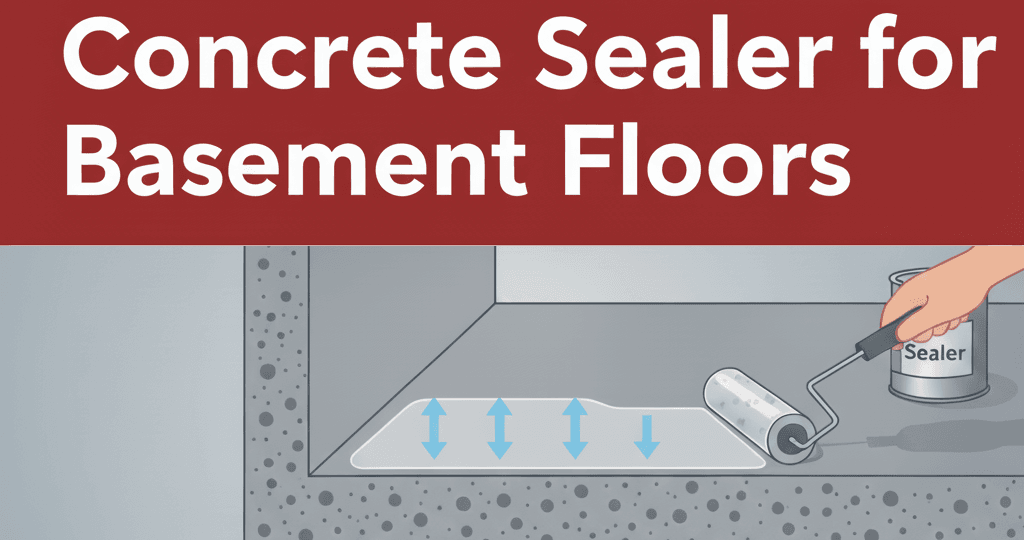Basement floors often face constant issues with moisture, cracking, or that persistent layer of concrete dust that never seems to go away. Over time, these problems can turn your basement into a damp, uncomfortable, and hard-to-maintain space. That’s why many homeowners start searching for solutions like concrete sealer for basement—a practical way to protect the floor from water intrusion, surface wear, and long-term deterioration. In this article, we’ll explain what a basement concrete sealer is, how it works, and how to choose the right one to keep your floors clean, durable, and well-protected for years to come.
Table of Contents:
- What Is a Concrete Sealer for Basement
- Key Benefits of Sealing Your Basement Floor
- Best Types of Concrete Sealers for Basement
- How to Choose the Right Sealer for Your Basement
- Conclusion
What Is a Concrete Sealer for Basement
A concrete sealer for basement is a protective coating applied to concrete floors to block moisture, stains, and surface damage. Unlike paint or simple waterproofing solutions, sealers penetrate or form a strong barrier on top of the surface, depending on the product type. This protection keeps water vapor, mold, and dust from seeping through the porous concrete, which is especially important in below-ground areas where humidity and temperature changes are common.
By sealing the surface, you create a stronger, easier-to-clean floor that resists cracking, chipping, and discoloration. Whether you use your basement as storage, a workshop, or a finished living area, applying a concrete sealer ensures your floor remains structurally sound and visually appealing for the long term.
Key Benefits of Sealing Your Basement Floor
Sealing your basement floor offers far more than just a cleaner look — it’s a practical way to protect your home from long-term moisture damage and costly repairs. The most immediate benefit is moisture resistance. Unsealed concrete easily absorbs water vapor from the ground, leading to dampness, musty smells, or even mold growth. A good concrete sealer blocks this moisture, keeping the space dry and preventing structural issues caused by trapped humidity.
Another major advantage is dust and surface protection. Over time, bare concrete naturally sheds a fine layer of dust that can coat furniture and storage boxes. By sealing the surface, you stop this dusting process entirely, creating a cleaner and healthier environment. Sealed concrete is also much easier to maintain—spills, dirt, and minor stains can be wiped away without soaking into the floor.
Additionally, sealing enhances durability and appearance. It helps the floor resist cracking, chipping, and chemical damage, which is especially useful if your basement doubles as a workshop or living area. A well-sealed floor also reflects light better, brightening the space and making it feel less like a damp storage room and more like an extension of your home.
Best Types of Concrete Sealers for Basement
Not all concrete sealers are made the same, and choosing the right type depends on how your basement is used and the kind of protection you need. Generally, there are two main categories: penetrating sealers and topical sealers.
1. Penetrating Sealers
Penetrating sealers soak deep into the concrete to create a barrier within the pores of the surface. They don’t change the floor’s natural look or texture, making them ideal for homeowners who prefer a more natural, matte finish. These sealers are great for basements prone to moisture since they provide long-lasting water resistance without trapping vapor. Common types include silane, siloxane, and siliconate-based sealers, all known for their excellent performance in damp conditions.
2. Topical Sealers
Topical sealers, on the other hand, form a visible protective layer on top of the floor. They’re available in acrylic, epoxy, and polyurethane formulations, offering a glossy or satin finish that enhances appearance while adding surface strength. These are perfect for finished or decorative basements where aesthetics matter. However, because they sit on the surface, they may need reapplication every few years and require the floor to be completely dry before installation to avoid peeling or bubbling.
Both types provide solid protection — penetrating sealers excel in moisture defense, while topical options boost appearance and ease of cleaning.
How to Choose the Right Sealer for Your Basement
Selecting the right sealer starts with assessing your basement’s specific needs. If your space tends to be damp or humid, a penetrating sealer is typically the better choice, as it prevents water intrusion while allowing the floor to breathe. These are best for utility basements or storage areas.
If your basement is finished, used frequently, or doubles as a living space, a topical sealer might be the way to go. It adds a clean, polished look while protecting the surface from wear and stains. Keep in mind that some high-gloss coatings can make floors slippery when wet, so choosing a non-slip additive is a good safety precaution.
Also consider ease of maintenance and reapplication. Penetrating sealers usually last longer and need less upkeep, while topical options may require refreshing over time but offer better aesthetics. Ultimately, the best sealer balances moisture protection, appearance, and durability according to how you use your basement.
Conclusion
The decision to apply a concrete sealer for basement floors is the definitive answer to the persistent challenges of moisture, dusting, and dampness. By understanding the core difference between breathable penetrating sealers and aesthetic topical coatings, you can confidently choose a product that directly addresses your unique pain points—transforming a problem area into a clean, durable, and healthy extension of your home.
If you are ready to eliminate chronic basement dust, stop moisture-related odors, and permanently protect your foundation, don’t attempt to navigate the complex world of sealers alone. Reach out to Ener-Spray today for expert guidance and professional application services, ensuring your basement floor receives the precise treatment needed for guaranteed, long-lasting performance.
